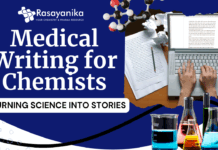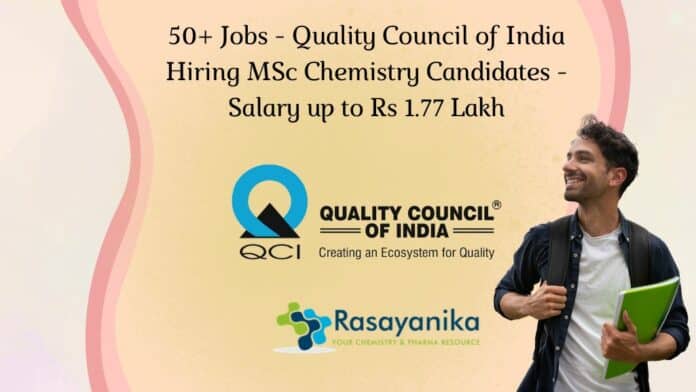Quality Council of India CGPDTM intends to recruit Examiners of Patents and Designs, General Central Service, Group ‘A’ Gazetted (Non-Ministerial) in Level 10 in Pay Matrix (₹ 56,100 – 1,77,500) plus applicable allowances, as admissible, in the Government of India.
The vacancies are tentative, which may be decreased or increased depending upon
the actual requirement at the time of final appointment
Job Title: Examiners of Patents and Designs, General Central
Service, Group ‘A’ Gazetted (Non-Ministerial)
Salary: Level 10 in Pay Matrix (₹ 56,100
– 1,77,500) plus applicable allowances, as admissible, in the Government of India
GENERAL INSTRUCTIONS
Quality Council of India All candidates are mandatorily required to read this Information Bulletin in its entirety. The candidates are required to ensure that they fulfill all conditions as contained in this Information Bulletin. Due to the large number of candidates that are expected to apply for appearing in this examination, electronic systems will be used to analyse the information submitted by candidates. Accordingly, the admission to various stages of the examination will be purely provisional and would be subject to physical verification of documents. Mere issue of e-Admit Card to the candidate will not imply that a candidature has been finally cleared
by the Competent Authority. The process of verification of documents and variousconditions prescribed in this document will be conducted after the declaration of
final list of qualified candidates.
HOW TO APPLY
Candidates are required to apply online by using the website www.qcin.org. No
other mode of application will be accepted.
Examination Fees
There will be an examination fee of ₹1000/- (Rupees One Thousand only) for
candidates belonging to General category and OBC category. For candidates
belonging to SC /ST category, PWD/ Differently abled (PH) category and women
applicants (from all categories) and any other person, the examination fee shall be
₹500/- (Rupees Five Hundred only).
RELAXATION / CONCESSION
The crucial date for claim of any kind of benefit, that is, reservation, fee concession,
age-relaxation, etc., shall be last date of submission of application. The Competent Authority reserves the right to debar any candidate for any malpractice, including for a fraudulent claim of any kind of benefit / relaxation / concession.
| S. No | Activity | Date |
| 1. | Online application process starts | 14th July 2023 |
| 2. | Online application process concludes | 4 th August 2023 |
| 3. | Issuance of e-Admit Card for Preliminary Examination | 14 th August 2023 |
| 4. | Preliminary Examination | 3 rd September 2023 |
| 5. | Declaration of result of Preliminary Examination | 13th September 2023 |
| 6. | Issuance of e-Admit Card for Mains Examination | 18 th September 2023 |
| 7. | Mains Examination | 1 st October 2023 |
| 8. | Declaration of result of Mains Examination | 16th October 2023 |
| 9. | Issuance of e-Admit Card for Interview | 22 nd October 2023 |
| 10. | Interview | 11th and 12th November 2023 |
| 11. | Declaration of final list of qualified candidates | 17th November 2023 |
Discipline: Chemistry
No.of posts:
SC: 8 ST: 3 OBC: 15 EWS: 6 UR: 24 Total: 56
Eligbility Criteria:
Master Degree in Chemistry or Bachelor Degree in Chemical Technology/ Engineering
or equivalent
Important Instructions to Candidates
a) No request for change in examination centre shall be entertained.
b) Rights for the rules for the cut off of the all stages for all the posts in the
examination are reserved by CGPDTM
c) If a candidate fails in such tests, his candidature will not be subsequently
considered for any other post/ department. Candidates are therefore required to
carefully go through these requirements.
d) The final allotment of posts is being made on the basis of merit-cum-preferences
and once a post is allotted, no change of posts will be made by the QCI.
e) Success in the examination confers no right of appointment unless QCI is
satisfied after such enquiry as may be considered necessary that the candidate is
suitable in all respects for appointment to the service/ post.
f) The candidates applying for the examination should ensure that they fulfill all the
eligibility conditions for admission to the examination. Their admission at all
stages of the examination will be purely provisional, subject to their satisfying
the prescribed eligibility conditions. If, on verification, at any time before or after
the written examination, it is found that they do not fulfill any of the eligibility
conditions, their candidature for the examination will be cancelled.
g) If candidates are found to indulge at any stage in any of the malpractices and
fraudery their candidature for this examination will be cancelled and legal actions
shall be taken by QCI. QCI may also report the matter to Police/ Investigating
Agencies, as deemed fit.
h) Before applying, candidates must to go through the instructions given in the
notice of examination very carefully.
i) Candidates seeking reservation benefits available for SC/ ST/ OBC/ EWS/
PwBD/ ESM must ensure that they are entitled to such reservation as per
eligibility prescribed in the Notice.
j) The candidates must write their name, date of birth, father’s name and mother’s
name strictly as given in the matriculation certificate otherwise their candidature
may be cancelled at the time of Document Verification or as and when it comes
into the notice of the commission.
k) Candidates are advised to fill their correct and active e-mail addresses and mobile
number in the online application as correspondence may be made through e-mail/
SMS.
l) In case of fake/ fabricated application/ registration by misusing any dignitaries
name/ photo, such candidate/ cyber cafe will be held responsible for the same
and liable for suitable legal action under cyber/ IT Act.
m) All decisions related to recruitment shall be made and enforced by QCI and will
be applicable for all candidates.
Syllabus:
Inorganic Chemistry
1. Chemical periodicity
2. Structure and bonding in homo- and heteronuclear molecules, including shapes
of molecules (VSEPR Theory).
3. Concepts of acids and bases, Hard-Soft acid base concept, Non-aqueous
solvents.
4. Main group elements and their compounds: Allotropy, synthesis, structure and
bonding, industrial importance of the compounds.
5. Transition elements and coordination compounds: structure, bonding theories,
spectral and magnetic properties, reaction mechanisms.
6. Inner transition elements: spectral and magnetic properties, redox chemistry,
analytical applications.
7. Organometallic compounds: synthesis, bonding and structure, and reactivity.
Organometallics in homogeneous catalysis.
8. Cages and metal clusters.
9. Analytical chemistry- separation, spectroscopic, electro- and thermoanalytical
methods.
10.Bioinorganic chemistry: photosystems, porphyrins, metalloenzymes, oxygen
transport, electron- transfer reactions; nitrogen fixation, metal complexes in
medicine.
11.Characterisation of inorganic compounds by IR, Raman, NMR, EPR,
Mössbauer, UV- vis, NQR, MS, electron spectroscopy and microscopic
techniques.
12.Nuclear chemistry: nuclear reactions, fission and fusion, radio-analytical
techniques and activation analysis.
Physical Chemistry
1. Basic principles of quantum mechanics: Postulates; operator algebra; exactlysolvable systems: particle-in-a-box, harmonic oscillator and the hydrogen
atom, including shapes of atomic orbitals; orbital and spin angular momenta;
tunneling.
2. Approximate methods of quantum mechanics: Variational principle;
perturbation theory up to second order in energy; applications.
3. Atomic structure and spectroscopy; term symbols; many-electron systems and
antisymmetry principle.
4. Chemical bonding in diatomics; elementary concepts of MO and VB theories;
Huckel theory for conjugated π-electron systems.
5. Chemical applications of group theory; symmetry elements; point groups;
character tables; selection rules.
6. Molecular spectroscopy: Rotational and vibrational spectra of diatomic
molecules; electronic spectra; IR and Raman activities – selection rules; basic
principles of magnetic resonance.
7. Chemical thermodynamics: Laws, state and path functions and their
applications; thermodynamic description of various types of processes;
Maxwell’s relations; spontaneity and equilibria; temperature and pressure
dependence of thermodynamic quantities; Le Chatelier principle; elementary
description of phase transitions; phase equilibria and phase rule;
thermodynamics of ideal and non-ideal gases, and solutions.
8. Statistical thermodynamics: Boltzmann distribution; kinetic theory of gases;
partition functions and their relation to thermodynamic quantities – calculations
for model systems.
9. Electrochemistry: Nernst equation, redox systems, electrochemical cells;
Debye-Huckel theory; electrolytic conductance – Kohlrausch’s law and its
applications; ionic equilibria; conductometric and potentiometric titrations.
10. Chemical kinetics: Empirical rate laws and temperature dependence; complex
reactions; steady state approximation; determination of reaction mechanisms;
collision and transition state theories of rate constants; unimolecular reactions;
enzyme kinetics; salt effects; homogeneous catalysis; photochemical reactions.
11. Colloids and surfaces: Stability and properties of colloids; isotherms and
surface area; heterogeneous catalysis.
12. Solid state: Crystal structures; Bragg’s law and applications; band structure of
solids.
13. Polymer chemistry: Molar masses; kinetics of polymerization.
14. Data analysis: Mean and standard deviation; absolute and relative errors; linear
regression; covariance and correlation coefficient.
Organic Chemistry
1. IUPAC nomenclature of organic molecules including regio- and stereoisomers.
2. Principles of stereochemistry: Configurational and conformational isomerism
in acyclic and cyclic compounds; stereogenicity, stereoselectivity,
enantioselectivity, diastereoselectivity and asymmetric induction.
3. Aromaticity: Benzenoid and non-benzenoid compounds – generation and
reactions.
4. Organic reactive intermediates: Generation, stability and reactivity of
carbocations, carbanions, free radicals, carbenes, benzynes and nitrenes.
5. Organic reaction mechanisms involving addition, elimination and substitution
reactions with electrophilic, nucleophilic or radical species. Determination of
reaction pathways.
6. Common named reactions and rearrangements – applications in organic
synthesis.
7. Organic transformations and reagents: Functional group interconversion
including oxidations and reductions; common catalysts and reagents (organic,
inorganic, organometallic and enzymatic). Chemo, regio and stereoselective
transformations.
8. Concepts in organic synthesis: Retrosynthesis, disconnection, synthons, linear
and convergent synthesis, umpolung of reactivity and protecting groups.
9. Asymmetric synthesis: Chiral auxiliaries, methods of asymmetric induction –
substrate, reagent and catalyst controlled reactions; determination of
enantiomeric and diastereomeric excess; enantio-discrimination. Resolution –
optical and kinetic.
10.Pericyclic reactions – electrocyclisation, cycloaddition, sigmatropic
rearrangements and other related concerted reactions. Principles and
applications of photochemical reactions in organic chemistry.
11.Synthesis and reactivity of common heterocyclic compounds containing one or
two heteroatoms (O, N, S).
12.Chemistry of natural products: Carbohydrates, proteins and peptides, fatty
acids, nucleic acids, terpenes, steroids and alkaloids. Biogenesis of terpenoids
and alkaloids.
13.Structure determination of organic compounds by IR, UV-Vis, 1H & 13C NMR
and Mass spectroscopic techniques.
Interdisciplinary topics
1. Chemistry in nanoscience and technology
2. Catalysis and green chemistry
3. Medicinal chemistry
4. Supramolecular chemistry
5. Environmental chemistry
View Main Notification
Quality Council of India Quality Council of India, Quality Council of India Looking for latest chemistry and Pharma job openings, follow Rasayanika Facebook and Telegram and subscribe to our youtube channel for the latest updates on chemistry and Pharma jobs and much more

















































